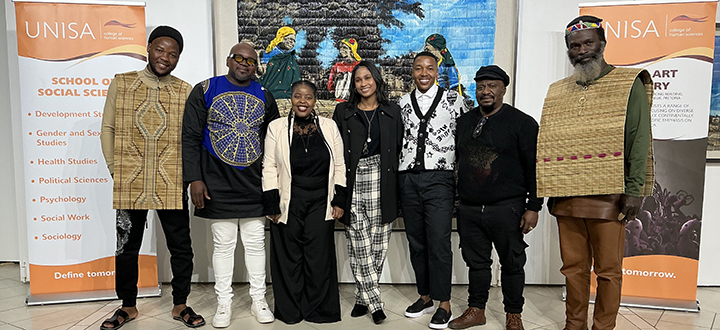News & Events
Exhibition explores the nuanced relationship between storytelling, materiality and cultural memory
On 26 May 2025, the Unisa Art Gallery, in collaboration with the Department of Development Studies, hosted the launch of Tsalwa: The Materiality of Stories, a solo exhibition by contemporary South African artist Fumani Maluleke. The exhibition is curated by Tshegofatso Seoka and explores the nuanced relationship between storytelling, materiality and cultural memory through Maluleke’s unique artistic practice.

From left: Fumani Maluleke (artist), Dr Lehasa Moloi (Unisa Department of Development Studies), Tshegofatso Seoka (Curator: Unisa Art Gallery), Keisha Jacobs (Art content and research specialist: Artyli Gallery), Keatlegile Mabena (Unisa Department of Development Studies), Dr Sebeka Plaatjie (Unisa Department of Development Studies), and King Joshua Marara Maponga III (art activist)
In Tsalwa: The Materiality of Stories, Maluleke employs the handcrafted straw grass mat that is traditionally used in many African homes as both a physical and metaphorical canvas to depict narratives of land, home and communal life. The term Tsalwa speaks to Maluleke’s engagement with the straw grass mat as a metaphorical scroll, transforming a utilitarian object into a vessel for cultural preservation and artistic expression.
The straw grass mat, known as Xitheve in Xitsonga, holds deep historical and cultural significance across Southern Africa, where it is recognised by various names, such as Legogo, Icanci and Moseme, in other African indigenous languages. In this exhibition, Maluleke recontextualises Xitheve as an archive of memory, inscribing upon it scenes of rural landscapes, childhood play and everyday labour, offering a rich visual account of life in Tsomo, Limpopo, where the artist traces his roots.
The opening event of the exhibition was followed by a panel discussion moderated by Dr Sebeka Plaatjie. The panel featured King Joshua Marara Maponga III and Keisha Jacobs as leading voices in the South African arts and development sector. Their discussion delved into Maluleke’s body of work with a focus on decolonisation, development and the aesthetic and cultural significance of the straw grass mat as explored in the exhibition.
The Tsalwa exhibition is open to the public at the Unisa Art Gallery. Interested viewers may also follow this link to explore a virtual tour of the exhibition: https://my.matterport.com/show/?m=FdKLFgp5nnE
For more information, please contact the Unisa Art Gallery curator, Tshegofatso Seoka, at seoakte@unisa.ac.za.
Book your viewing of exhibitions at seokate@unisa.ac.za
ABOUT THE UNISA ART GALLERY
Since its inception in 1986, the Unisa Art Gallery has grown to become one of South Africa’s premier exhibition spaces. It boasts a remarkable permanent collection featuring works by some of the most prolific contemporary South African and international artists.
The Gallery hosts a dynamic range of exhibitions that engage with themes relevant globally, continentally and nationally, with a particular focus on South Africa. It fosters critical discourse, artistic innovation and cultural reflection through these exhibitions.
As part of our commitment to education and research, the Unisa Art Gallery serves students, staff and the public by providing access to an extensive art collection, archive and inventory of catalogues, as well as research materials. Visitors can explore these resources through the Unisa Art Gallery website and on-site engagements, including artist walkabouts, workshops and learning sessions. Whether in-person or through digital platforms, the Gallery's programmes aim to inform, inspire and empower its audience.
Entry to the gallery is free.
* By Katlego Pilane, College of Human Sciences
Publish date: 2025-06-12 00:00:00.0

